Graham Reid | | 9 min read
Jim Carroll: Reading from The Book of Nods (1981)
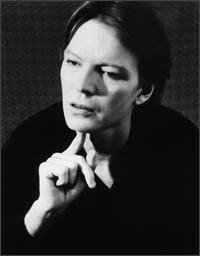
Keep a diary and some day it’ll keep you. -- Mae West.
The blizzard which has engulfed New York has abated a little although snow is still piled over parked cars and a flesh-freezing wind whistles between the tenement blocks.
And Jim Carroll - former junkie and rock singer, writer, poet and most recently movie actor on the strength of a cameo slot in the film adaptation of his The Basketball Diaries - has to go out.
“Yeah, this art exhibition down in
SoHo. Like, I don`t even know where it is and ahh . . . I have to go
over to my friend Harmony’s house and Chloe . . . you know the
movie Kids, well Harmony’s ahh, he’s, like, the guy that wrote it
and Chloe plays ahh . . . you know, the female lead and the girl
that’s having the show is, like, Chloe’s best friend, you know
...”
When Jim Carroll talks it is with a
cracked hesitancy punctuated by long pauses. Like Lou Reed’s New
York album slowed to half speed.
But yeah, he has to go out, like, in
maybe 10 minutes but ahh . . .
An hour later he’s still talking,
joking about spoken word guys like Henry Rollins: “We don`t see eye
to eye, he dissed me in some magazine - but I find what he does very
tiresome. He and others from the rock scene think poetry has some
hideous connotation. It’s always been okay with me!”
Or he's laughing about that cameo where
he plays a strung-out junkie like some Italian hipster he knew as a
kid: “I just wish they’d lit me better. I look like I just rose
from the dead. I did another scene I liked better which was the
original ending, me doing my David Caruso impression!"
Or talking about Patti and Lou: “Patti
and I did a reading recently in Seattle at the opera house, a very
elegant crowd.”
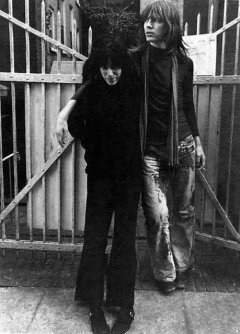 And that’s Jim‘s world. Patti Smith
and Lou Reed are longtime friends, he walks through gallery openings and the
hip film crowd, has just seen another of his pieces (“just a
12-page story”) made into a feature film which won awards at
Toronto and Berlin film festivals, is writing the outlines of a
couple of novels and turning down more cameo roles.
And that’s Jim‘s world. Patti Smith
and Lou Reed are longtime friends, he walks through gallery openings and the
hip film crowd, has just seen another of his pieces (“just a
12-page story”) made into a feature film which won awards at
Toronto and Berlin film festivals, is writing the outlines of a
couple of novels and turning down more cameo roles.
But it wasn't always so as the journal
of his youth, The Basketball Diaries -- a wired Catcher in the Rye,
excerpts of which were first published in the influential literary
journal The Paris Review in the late Sixties – attest.
Jim was the Catholic boy who made the team, won a scholarship, sniffed glue, smoked a lot of dope and ended-up with a habit.
But through it all he wrote and now, more than
15 years after it was first touted as a film property, the acclaimed
The Basketball Diaries has made the big screen.
With Leonardo DiCaprio, who bears an
uncanny likeness to the young Jim (“That’s what Lou says too, but
he’s so sardonic. I wasn’t quite as thin!"), the film
appropriates sections of the book into a continuous narrative and
weaves a story out of what were adolescent diaries never intended for
publication.
Carroll likes the film but “I sold
the option every year practically so it’s been a nice stipend for
me. I feel bad it’s not there now." He laughs like an
asthmatic jackal again and the creaking monotone rolls off into yet
another stream-of-consciousness anecdote.
Carroll is an easy conversationalist
and his language betrays his literary leanings. Something was
“germane” to the movie, he didn’t “vouchsafe” those high
school photos to the movie company and it was “happenstance thing”
he was “recording a radio show at the Electric Ladyland studios
when Rancid were recording downstairs and so that’s how came to be
on their album doing that rap in one of the songs and one of the
lines I said was ‘and out come the wolves’ and so that became the
title of their album”.
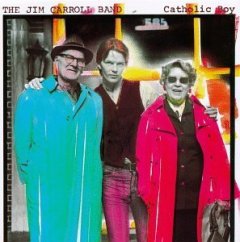 It’s hard to believe this creaking
monotone full of sudden stops is the same voice that wrapped itself
around some edgy if patchy rock’n’roll albums (Catholic Boy, Dry
Dreams, I Write Your Name) back in the early Eighties, which mostly
catalogued his life in songs such as People Who Died -- a litany of
dead friends – which reappears on The Basketball Diaries soundtrack
alongside Soundgarden, the Cult, and the Doors.
It’s hard to believe this creaking
monotone full of sudden stops is the same voice that wrapped itself
around some edgy if patchy rock’n’roll albums (Catholic Boy, Dry
Dreams, I Write Your Name) back in the early Eighties, which mostly
catalogued his life in songs such as People Who Died -- a litany of
dead friends – which reappears on The Basketball Diaries soundtrack
alongside Soundgarden, the Cult, and the Doors.
Carroll is the junkie survivor and
today, with the book having bounded up the New York Times best-seller
list in the wake of the film, he’s in demand again, back out on the
college circuit and the occasional rock club doing readings, talking
about another rock album he might do with Lenny Kaye because they
recorded a few songs together (and with Pearl Jam) for the soundtrack
but which didn’t make the final selection . . .
The book always sold, he says, but he
was worried if the movie was no good it would stop sales. “I like
the idea of film, but to me my work is the book.”
What has ensured the success of the
film -- aside from DiCaprio’s mesmerising performance and a strong
ensemble which includes rapper and Calvin Klein poster-boy Mark
Wahlberg (Marky Mark) -- is its slightly anachronistic timelessness.
Written between 1963 and '66, the book
has been pulled gently into the Nineties by the contemporary rock
soundtrack but, as Carroll notes, “they really put it in no time,
but that time is now.”
His original idea back in the early
Eighties, when a young Matt Dillon was touted as the lead, was to
have period music by Dion and the Belmonts to keep it a Sixties
setting.
“The first time I saw the film was
with Lou and it didn’t have the soundtrack and he’d just done a
song for that tribute album to Doc Pomus [Till the Night is Gone] and
he thought that song [This Magic Moment], real New York stuff, would
be good because he thought it was in that period. So there’s not
much in the film to pin it in time.
“Like, they told Marky he couldn’t
wear his B-boy clothes -- but when they are playing basketball they
wear those long baggy shorts. So, I dunno ...”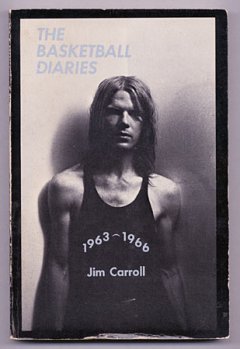
He admits he was down on Marky Mark at
first but the controversial rapper (who has sounded off about gays in
the past) auditioned seven times “so I thought I shouldn’t hold
his paraphernalia against him . . . and Leo didn’t like him much
but now they’re great old buddies.
“But the performances are great. I
talked a bit to Leo but said nothing special. They had some drug guy
-- who I actually knew, he used to be a roadie for the Blue Oyster
Cult -- and he was telling Leo what to do in the drug scenes."
But if Carroll has an objection to
anything in the adaptation it's the moral agenda about drugs,
something neither his book nor music have ever done. Promotional
video interviews with the actors show them advancing the anti-drug
message too.
“I liked the screenplay on paper and
made a few changes and what I liked best were the voice-overs
straight from the book. But then they changed the ending.
“The original ending was shot in New
York but then they flew Leo and people out to LA for that whole
poetry reading and he read a different piece. It just became too much
of the drug cautionary tale thing and they assured it wouldn’t be
like that, just neutral like the book. But I didn’t have any power
at that point.
“I saw a lot of possibilities in
Ernie Hudson’s character [as the black hoop-shooter who attempts to
cure Jim in an enforced cold turkey] because he was interested in
writing and the film didn’t show the development as a writer. It
misses a big part of the book. Every screenplay I’ve seen had some
flaws, they concentrate on the early years or the later years and
Catholicism, most all have concentrated on the fish-out-of-water
aspect of getting a scholarship to the exclusive private school . .
.but they didn’t use that in this! They made it like I was in
Catholic school all the time. The film works best when they left the
camera on Leonardo and the cast.
“And my writing and song lyrics
basically are very ethical in a certain way and I've always felt you
could find some purity inside the worst degradation, some sense of
light. But as far as the heroin thing, when I was writing I was so
young I couldn’t make any moral conclusions. I was just writing
down what happened and I think that's the appeal of the book . . .
but it’s not unusual a film adaptation takes on some moral aspect.
“It surprised me though because that
was a really big thing they weren’t going to capitulate to that.
It’s always been a problem because the end of the book is very
literary with him just looking out his window after his three day run
where he has his first habit.
“I guess you have to tie up the ends,
like walking down the street or die. I thought it would have been
better if they’d killed me off."
He cackles again and gets an even
bigger laugh out of the film’s promo tag “the death of innocence
and the birth of an artist”.
“I was in a movie theatre when they
played the trailer and they used that line and said ‘this is about
JIM’ in this big stereo surroundsound. My friends just had
hysterics.
“And I don’t think my innocence was
dead. It was just tarnished and there are many forms of innocence. I
still haven't exhausted all aspects of it.”
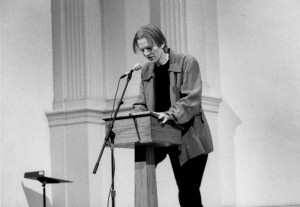 As one who has seen himself marked
before -- CBS Records tried to sell him as the authentic voice of New
York's rock’n’roll mean streets for those albums – he is
cynical about the promotional trailers for the film which variously
present the movie as either A Hard Day's Night (lots of running
freely down the street), a hippie trip (one trailer snips out the
sole psychedelic scene) or a teen movie (DiCaprio and his buddies
joking it up).
As one who has seen himself marked
before -- CBS Records tried to sell him as the authentic voice of New
York's rock’n’roll mean streets for those albums – he is
cynical about the promotional trailers for the film which variously
present the movie as either A Hard Day's Night (lots of running
freely down the street), a hippie trip (one trailer snips out the
sole psychedelic scene) or a teen movie (DiCaprio and his buddies
joking it up).
But Carroll freely admits to long ago
having given away attachment to the book, the film and the young boy
that was once him.
He refers to the boy in the book in the
third person and how works of art stand on their own, he says,
outside of their creator. They take on an independent life over which
the artist can have no further control. It’s like a painting, he
says . . . and, before embarking on another analogy or illustrative
anecdote, is reminded that he has something he should be doing.
"Oh, yeah, I gotta go to this art
opening, gotta meet my friends, Harmony and Chloe, like ahh, you know
. . ."
And Jim Carroll’s back on the
streets.
Jim Carroll died in September 2009,
he was 60.

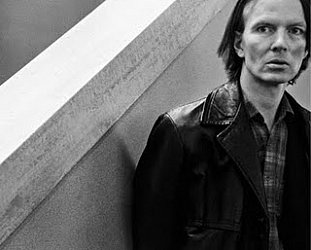
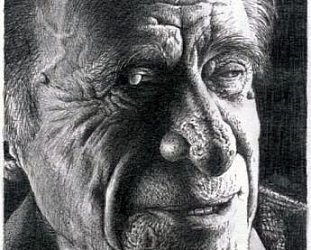
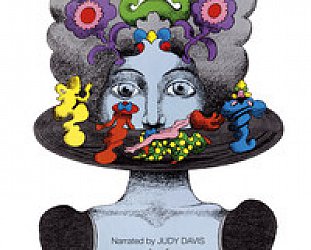
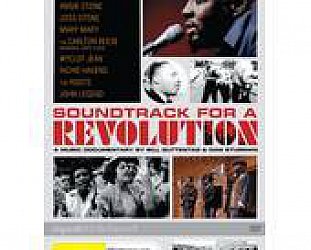
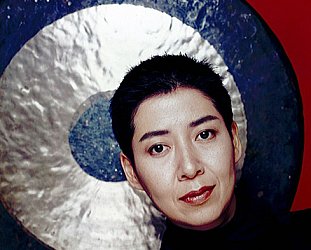

post a comment